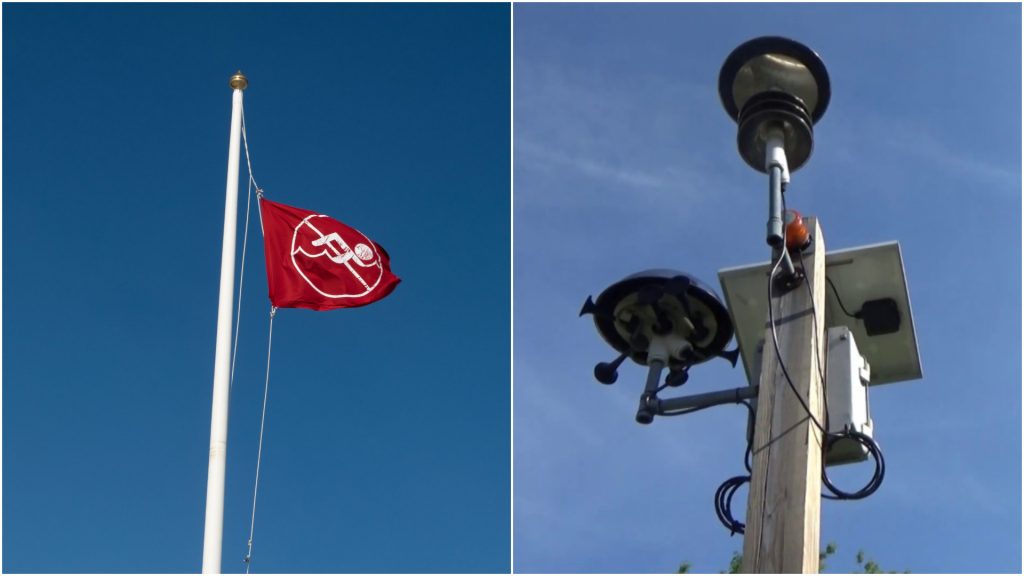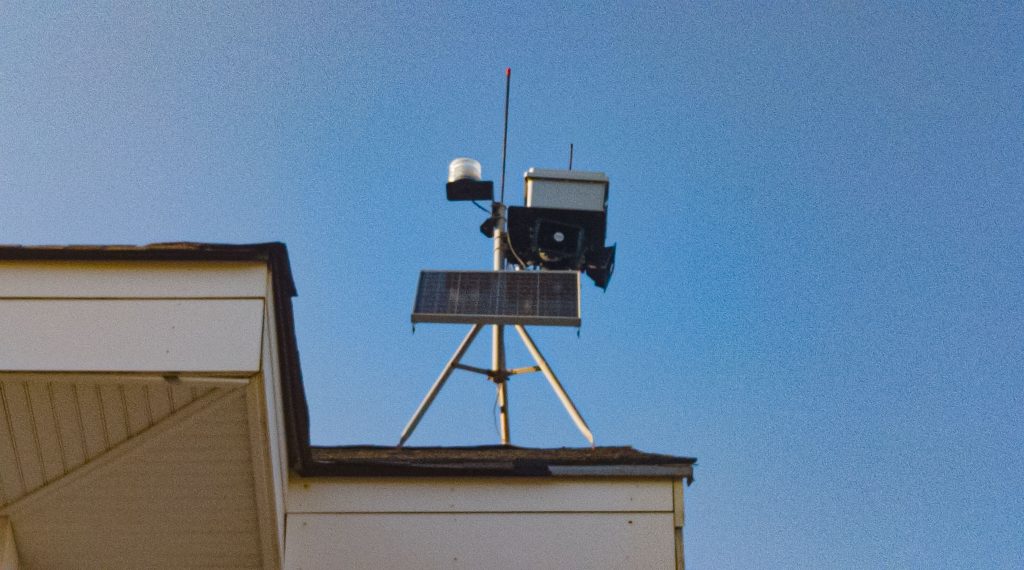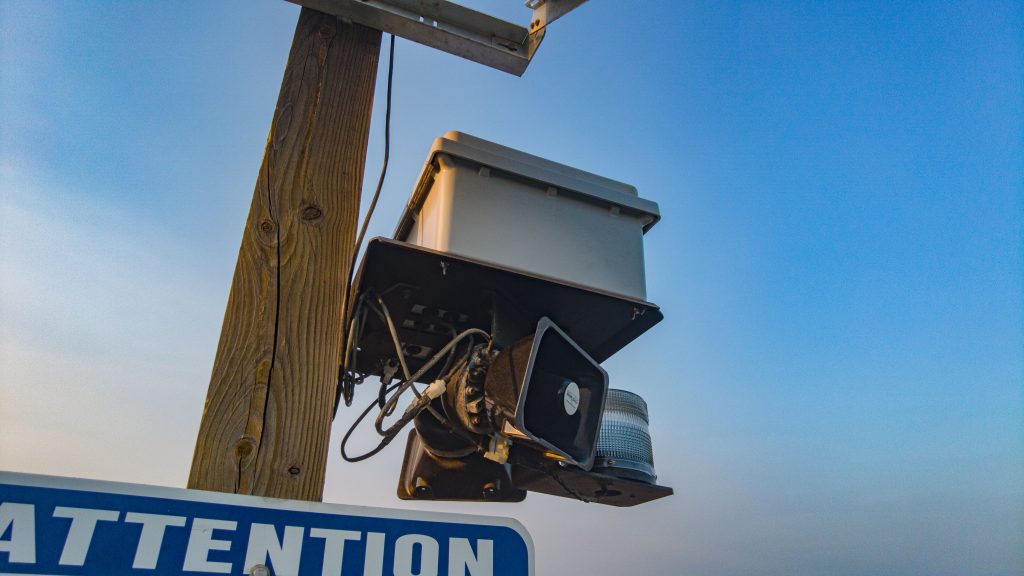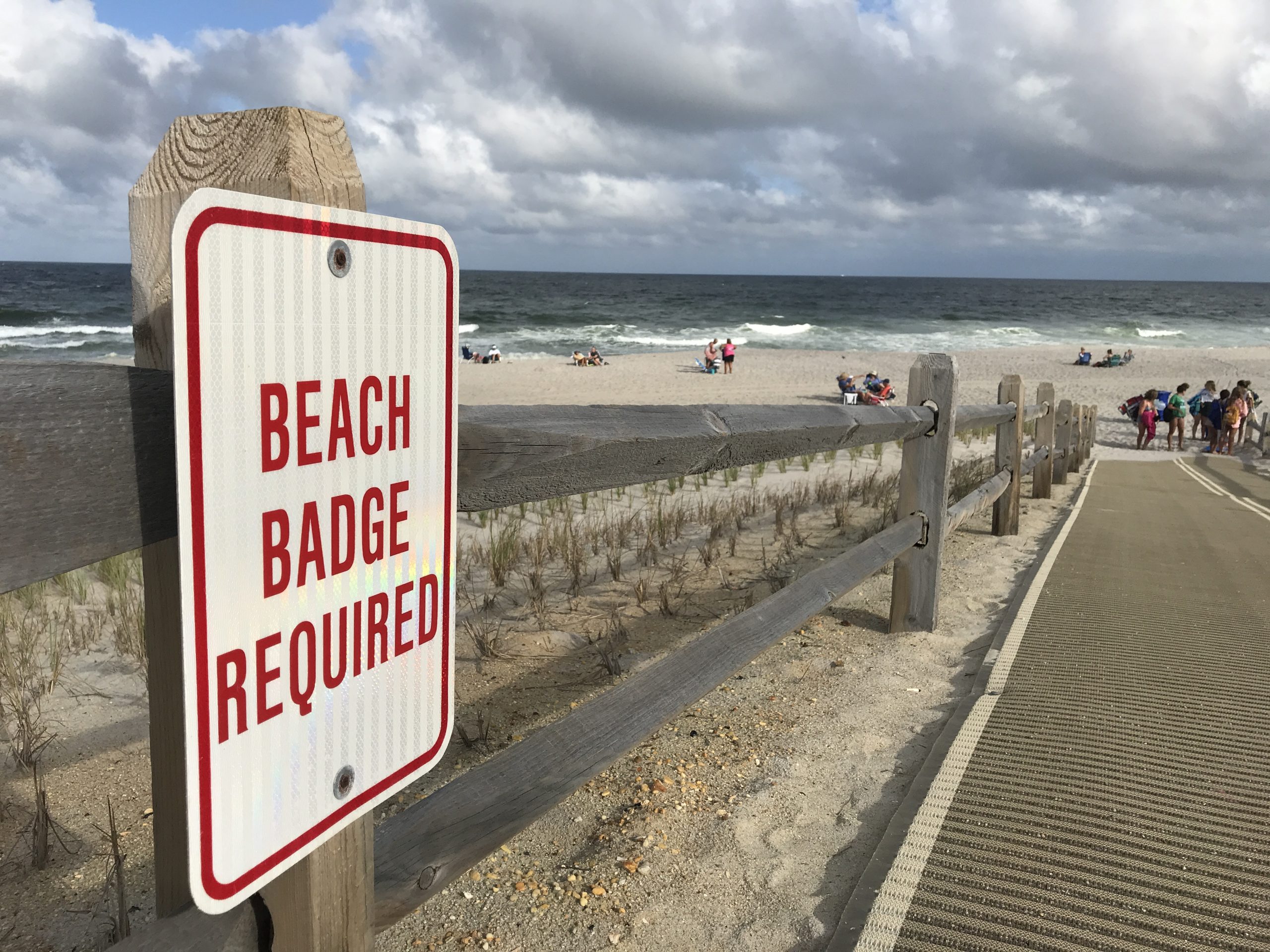
A hazard flag flies at Brick Beach I; the Thor Guard lightning system. (Photos: Daniel Nee / Thor Guard)
Seaside Park officials is the latest Shore community to have added a lightning detection array to its beachfront, but based upon legal advice from the borough attorney, officials have determined the device will function only during limited hours and limited dates.
The legal hiccup, which emerged after Borough Attorney Steven Zabarsky consulted with the borough’s insurance carrier, garnered objections from some members of the borough council, but ultimately officials decided to keep to a prepared plan of operations that only allows the array to operate between 9:30 a.m. and 5 p.m. when lifeguards are present. The council members opposed to limiting the detector’s hours argued that it may be more important to have the detector running when lifeguards are not present to monitor the weather and advise beachgoers accordingly, such as after hours or after Labor Day weekend, when the array is set to be turned off until next season.
The dilemma, Zabarsky told council members, is akin to hiring lifeguards to watch over a pool or beach. If there are no lifeguards, swimmers bathe at their own risk, but if lifeguards are present, an entity is exposed to liability if something goes wrong when they are there. Similarly, a lightning detector operating without designated “weather spotters” and borough staff, as called for by an implementation plan printed by the National Oceanic and Atmospheric Administration (NOAA), a federal agency, could likewise expose taxpayers to lawsuits if a person is struck by lightning and procedures for running the detector and removing people from the beach are not followed.
“To implement the plan, it requires us to have lifeguards, watchers, and it has a very specific operation plan with how things are going to occur,” said Zabarsky. “And the way it can occur is to have our staff present. If they’re not present, you cannot implement that plan, and that’s what imposes a substantial liability risk.”
Zabarsky said he reviewed the plan with a representative from the Ocean County Joint Insurance Fund and he agreed that the detectors can only operate when staff is available.
“Some places do continue to operate it, maybe, a half-hour earlier or later,” he said. ” But if you look at this plan, it requires weather watchers, lifeguards giving out warnings. As far as that is concerned, it has to [run] when we have staff at the beach. It can’t just be lights and sirens going off and people wondering why, or what’s going on, since we don’t have our staff there to implement the plan.”
“That doesn’t make any sense to me,” said Councilman Ray Amabile. “Why even have it there if the lifeguards are already there to [warn] people? It’s just my opinion – can we change the plan? Maybe we can go 12 hours.”
Zabarsky responded that the plan was drawn up by the NOAA and provided by the insurance carrier, and should not be modified by the borough.
“‘If you don’t have the plan, then don’t have the system,’ is what the response will be from our insurance carrier,” Zabarsky predicted.
Amabile characterized the system as having “spent money for nothing” if it can’t be used the vast majority of the time.
“What happens after Labor Day?” he asked. “The system doesn’t work? People do go on the beach in September at their own risk. How about at night?”
Indeed, the plan calls for the system to be turned off after Labor Day, and every night during the summer after 5 p.m.
Councilwoman Gina Condos agreed, especially with reference to summer evenings, when beaches still attract visitors and events are commonly held.
“I still don’t feel like it’s making any significant difference compared to what we already have in place, and yet we invested in this so we would have an automated system that could be used for wider hours,” said Condos. “I understand the liability piece … but is there a reason we can’t extend those hours? People walk on our boardwalk after hours, people sit on our beaches after hours, and we do Kite Night with families until dusk. To me, the hours are inadequate for the activities we support here in town.”
Amabile said beachgoers can be educated on the lights and sirens by signage and social media outreach.
“As far as liability, I want to protect Seaside Park, but I also want to protect the people of Seaside Park,” he said.
Mayor John Peterson said the policy will continued to review the matter at future council meetings.
“One of the issues the [Joint Insurance Fund] is concerned about is appointing weather watchers, who are our senior lifeguards, but alternates who are not there at a given time,” he said. “So we’d have to look at who would be assigned after hours.”
Amabile held that the system should operate whenever there are people heading to the beach.
“On the way to the council meeting tonight, I saw a group of 10 or 12 people walking up to the beach,” he said. “They’re going to be on the beach, and if there’s lighting, nothing will go off. Why did we buy this system?”
“It doesn’t make sense to me,” he added.
Zabarsky said the implementation plan could be modified in the future.
“It’s not written in stone,” he said.

Advertisement

Police, Fire & Courts
Police Investigating Possible Shots Fired in Seaside Heights

Police, Fire & Courts
Cops: Juvenile Arrested After 118mph Joy Ride in Seaside Heights, Toms River Kills 2

Seaside Heights & Seaside Park
Seaside Heights Mourns Passing of Boardwalk Legend, Still Working Into His 90s










